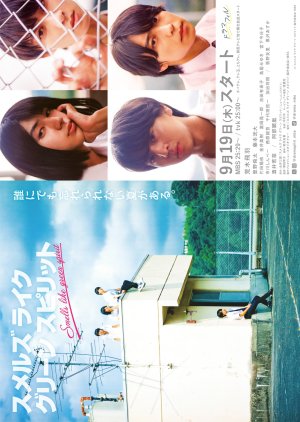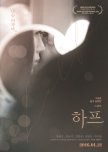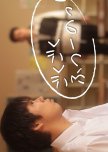- Français
- ภาษาไทย
- Türkçe
- Português (Brasil)
- Titre original: スメルズ ライク グリーン スピリット
- Aussi connu sous le nom de: Sumeruzu Raiku Guriin Supiritto
- Scénariste: Arai Yuuka
- Réalisateur: Sawada Ikuko
- Genres: Vie quotidienne, Jeunesse, Drame
Distribution et équipes
- Araki TowaMishima FutoshiRôle principal
- Sono ShuntaKirino MakotoRôle Secondaire
- Fujimoto KodaiYumeno TaroRôle Secondaire
- Abe AranYanagidaRôle Secondaire
- Sakai WakanaMishima Kayo [Futoshi's mother]Rôle Secondaire
- Kaji MasakiEdokawa ToshihikoRôle Secondaire
Critiques

Cette critique peut contenir des spoilers
Not a typical BL, coming of age and discovering yourself
While many of us not understanding japanese have gripes with some of the subtitles, the second negative was the wig. It was a distraction in the whole series. It's not such projects are done overnight, so after casting they could have told him to grow his hair and use extensions.The third negative is the ending for one of the characters, keeping in the closet, being at least gay and denying himself to be truly happy but getting married for the "family".
The ending for Mishima could be closer to the manga where you see him living with Fujimoto together as a happy couple.
Other than that, the team removed some of the harshest scenes from the manga and tuned it down for normal viewers in contrast to "Happy of the End" which was raw. Other than that, the story was very close to the manga, the acting and cinematography was really good.
Mishima grows after enduring mental and sexual abuse, also with help of his understanding mother. The change of Fujimoto from bully to lover was also nicely done.
Overall a depcition of the harsh reality in a rural area in the 1990ties which is still common nowadways where especially boys who do not conform to expectations of society are still bullied without reason and due to bad parenting. There should be licence to be a parent imho, because it's a lot harder than driving a car.
When you find a service which offers good subtitles, you should watch it, but don't expect a BL, because it's a gay series which is a trend I wholeheartedly approve of.
Cet avis était-il utile?

Cette critique peut contenir des spoilers
Unrealistic reality
Mishima is in his last 2 years of highschool. Bullied by those who perceive him to be gay due to his long hair and soft appreance, he endures the scrutiny of all and sexual abuse at the hands of a closeted teacher. He internalizes everything and barely responds to his external environment. At night, he sneaks out his mother's lipstick and on occassion dresses as feminine as he can, while living in a small country village. In one scene he is mistaken for a girl as he's dressed in shorts, tshirt and walks a liitle gently. He doesn't pretend to be what he's not but he doesn't admit it as well.Awakening to himself, he befriends two previous bullies, Kirino and Yumeno. Kirino, an ally, also aware of his own nature, bonds with him. Together, they navigate the complexities of desires, dreams, the need to feel included and protected. Yumeno, crushing secretly on Mishima, has a fierce sense of wrong and right, and struggles to come to terms with his feelings for him. Mishima welcomes the attention from Yumeno.
Mishima was seen hugging both at different times for completely different reasons. After the physical attack, Yumeno comforts him publicly. Unashamed. Kirino, in turn, understanding his pain, comforts him after being rejected. This is how the rumors start and story veers to similar coming of age trope. Who will they become? This where my disappointment begins.
The subtitles are a little shaky from different sources, so I'll take it with a grain of salt but it has the same outcome no matter the true meaning - Kirino, conflicted on the getaway trip to Tokyo, says to Mishima, "I chose this." Previously, he expresses his desire for men, make up and being gay. He acknowledges the path ahead is difficult but assimilates into being straight for the love of his family. My disappointment stems from the path he chose - to be not himself but the path someone else sees for him. His parents will eventually die and he as it's shown, he will be in a marriage with a child but will he be happy. Even he had concerns of this. He avoids Mishima and their bond is broken. His loss. Yumeno, who sees all, follows Mishima, apologizes for past hurts and asks to keep thinking of Mishima.
The series ends with Mishima asserting himself. He is no longer shy and detached. He is a gay man, in men's clothing and still maintaining a strong relationship with Yumeno. Though the implication is more, as Yumeno kisses his cheek before leaving. As a makeup artist, Mishima's world has grown and he is proud of who he is on his terms.
Araki Towa, who played the role of Mishima, did a wonderful job. There is a vast difference between the teen and the adult. Which I applaud. Sakai Wakana, Mishima's mother, was also wonderful. Her unwavering support ensured that Mishima would succeed and Sakai did this beautifully. I am not a fan of easy choices or choosing to be what you are not. Yumeno's character makes it appear to be a choice. Even in the1990 setting, being gay or not being gay, shouldn't be a choice. I'm reminded of the series More Than Words here. The only choice that should matter is loving yourself, finding your happiness and pride in the human you are. Thank you, Mishima.
Cet avis était-il utile?

















































